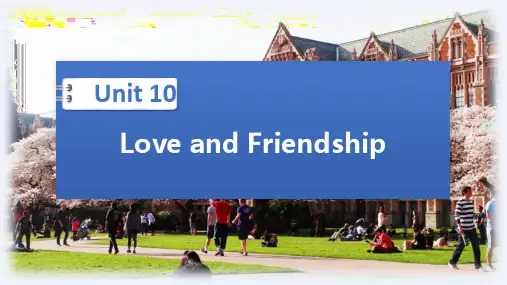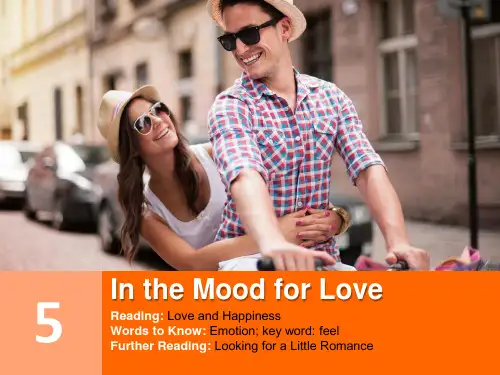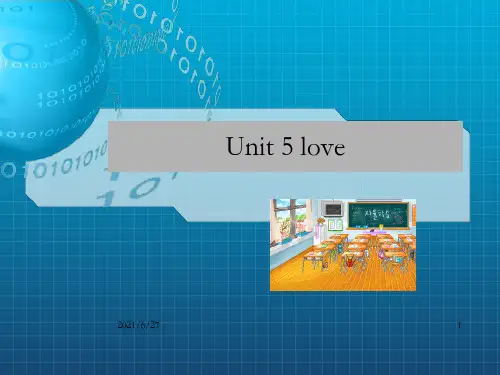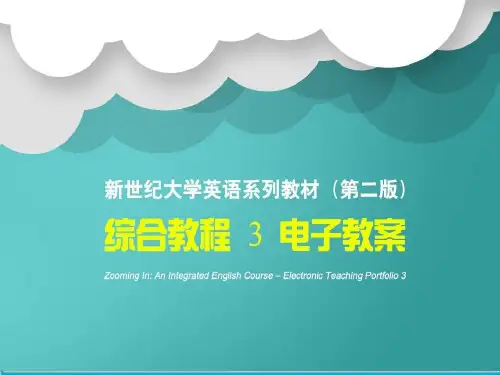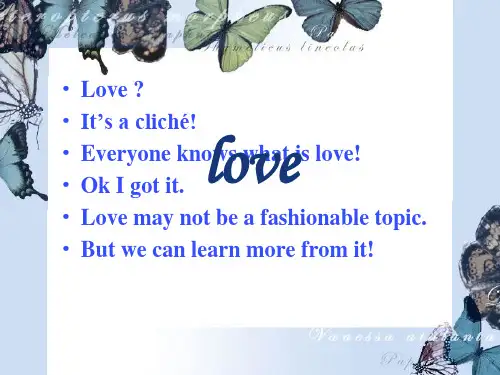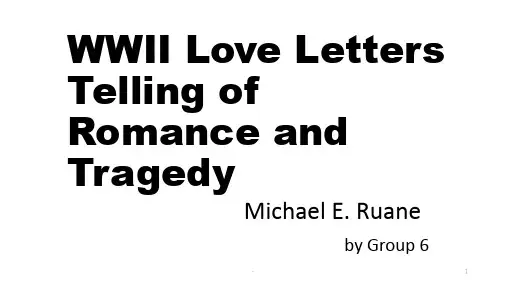大学英语PPT_《love》
- 格式:ppt
- 大小:1.50 MB
- 文档页数:18
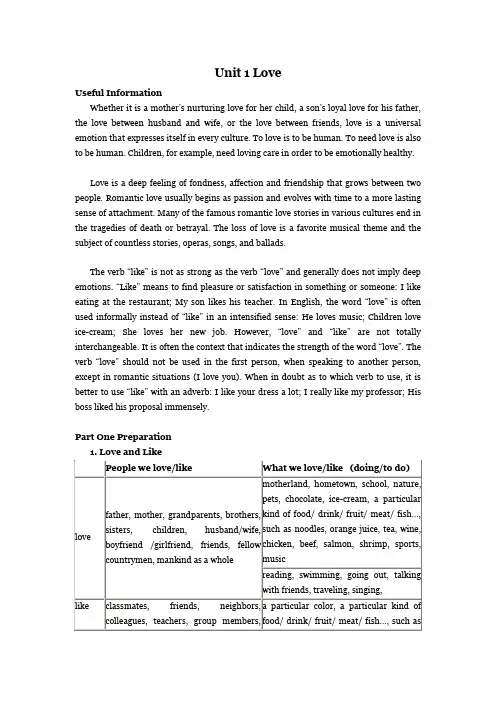
Unit 1 LoveUseful InformationWhether it is a mother’s nurturing love for her child, a son’s loyal love for his father, the love between husband and wife, or the love between friends, love is a universal emotion that expresses itself in every culture. To love is to be human. To need love is also to be human. Children, for example, need loving care in order to be emotionally healthy.Love is a deep feeling of fondness, affection and friendship that grows between two people. Romantic love usually begins as passion and evolves with time to a more lasting sense of attachment. Many of the famous romantic love stories in various cultures end in the tragedies of death or betrayal. The loss of love is a favorite musical theme and the subject of countless stories, operas, songs, and ballads.The verb “like” is not as strong as the verb “love” and generally does not imply deep emotions. “Like” means to find pleasure or satisfaction in something or someone: I like eating at the restaurant; My son likes his teacher. In English, the word “love” is often used informally instead of “like” in an intensified sense: He loves music; Children love ice-cream; She loves her new job. However, “love” and “like” are not totally interchangeable. It is often the context that indica tes the strength of the word “love”. The verb “love” should not be used in the first person, when speaking to another person, except in romantic situations (I love you). When in doubt as to which verb to use, it is better to use “like” with an adverb: I li ke your dress a lot; I really like my professor; His boss liked his proposal immensely.Part One Preparation2. Can You Tell the Difference?Sample 1It’s true that motherly love is unconditional. I believe what I’ve got from my mother is the deepest love I’ve ever received. When I was at home, mother took good care of me and did what she could to meet my needs. For example, she remembered all my birthdays and bought nice birthday gifts for me, but she never celebrated hers. At home she woke me up in the morning after she had prepared breakfast. Sometimes she even combed my hair while I was having breakfast so that I could get to school on time. She treated my classmates kindly when they were with me. I know that’s because they were my good friends. Now I’m away from home, she calls me every two or three days asking about my college life and what she can do for me. It seems that my life is much more important than hers.As for fa therly love, I’m not sure if his love is conditional, but obviously it’s different from mother’s love. Father also loves me very much. He pays more attention to my education and what I’m going to be in future. He doesn’t care much about my daily life, but asks me to keep him informed of my study and progress. During my last year in high school, he was unusually patient with me. He encouraged me when I wasn’t doing well at school and helped me when I had difficulties. Father must have been a math wizard in his school days. He seemed to know all the solutions to my math problems and could point out my weaknesses. Following his instructions, I began to feel interested in math myself.Sample 2I think there’s something in his statements, although it’s hard for m e to identify whose love is fatherly and whose love is motherly in the case of my parents. Unlike most mothers in the world, my mother has been very strict with me. Maybe she thinks a boy should develop a strong, tough and persistent personality to be able to get around in this competitive world. She pays a lot of attention to my study and has been concerned with my progress. Although she didn’t receive higher education herself, she believes it is essential to me and hopes I can continue my study after I finish the undergraduateprogram. When I didn’t do well in school, mother would ask me to reflect on my failure and see how I could do better the next time. Mother would be very angry if I argued for my problem or covered any of my wrong doings. Several times when I was in my junior high school, I doubted that I was her biological son.On the other hand, my father has been very kind to me. He knows my needs and does his best to satisfy them. When mother criticized me, father would comfort me afterwards. When father had something good, he would ask me if I needed it. I still remember father bought me a lot of toys in my childhood, such as toy vehicles and robots. And he bought me a lot of books during my school years. Father even made a few of his business trips during my vacations so that he could take me with him to see the places. Now father always looks forward to my going back home before holidays. Each time he would offer me the nice things he has bought or received since I last saw him and feel very happy if I take any of them. I also enjoy his company very much, feeling secure and relaxed. That’s why I often think I have the best father in the world.3. Someone You Love MostSample 1I love my mother most, because she’s always very kind to me, unlike my father who will scold me or slap me if I make mistakes or if I am naughty. My mother is an ordinary-looking woman, but in my eyes she is very beautiful. She is very hard-working, and does almost all the housework. When I was working for the entrance examination, she was very thoughtful and never let me do any housework. When I didn’t do a good job in school, she would encourage me and hope I would do better next time. When I was hungry at night, she would fix a snack for me. She is a good cook, now it’s a pity that I am not able to have what she cooks because I am far away from home.Sample 2I spent my childhood with my grandfather because my parents were too busy to take care of me at that time. Now I often visit him, especially in holidays. He’s a very kind and knowledgeable person. He reads a lot and knows so much about the history of our country. Before I could read, he told me many interesting stories: stories about Monkey King, heroes in The Three Kingdoms and Water Margins, etc. When I was in the e lementary school, he began to buy books for me and that’s why reading is always my hobby.I believe I owe a great deal to my grandfather for my growth, physical and intellectual. He’s been taking good care of me and I often feel I’m lucky to have such a ki nd, thoughtful, intelligent and generous grandfather.Part Two Reading-Centered ActivitiesIn-Class ReadingI.Pre-Reading1. I feel pity towards those who are disabled. I wonder how they can manage in their daily life and whether they have a job. I feel lucky that I’m not disabled.2. Yes. My aunt is deaf and dumb. She has been like this since her childhood. My grandmother said that she became deaf because of taking the wrong medicine. She is now more than seventy years old and she has never been married. She was very kind to me. In fact it was she who brought me up. She often felt it was unfair because she couldn’t hear. But she is very intelligent, and she is good at sewing. She sometimes kidded me with gestures that she wanted to cut off her ears becaus e they didn’t work.II. Passage ReadingNotes:1. There are five districts in N.Y. They are also called five boroughs. They are: Manhattan, Brooklyn, the Bronx, Queens, and Staten Island. Central Park and Harlem are both located in Manhattan. Brooklyn is located just across the river from Manhattan.2. The subway station uses tokens and they cost about 50 cents each.3. Baseball is an outdoor game between two teams of nine players, in which players try to get points by hitting a ball and running around four bases. It is one of the most popular games in the United States.Words, Phrases and Grammatical Points1. …I was embarrassed to be seen with my father(l.1)This can be paraphrased as “I was embarrassed when the others saw me together with my father”.2. despite (l.9)e.g. Despite all our efforts to save the school, the County decided to close it.She went to Spain despite the fact that the doctor had told her to rest.同义词组:in spite ofe.g. We went out in spite of the rain.Kelly loved her husband in spite of the fact that he drank too much.3. ice-free 类似的词有:a salt-free diet, a trouble-free journey, duty-free, rent-free 等(l.14)4. …nor did he show any envy of the more fortunate or able. (l.20)这是一句用“nor”引导的倒装句。
